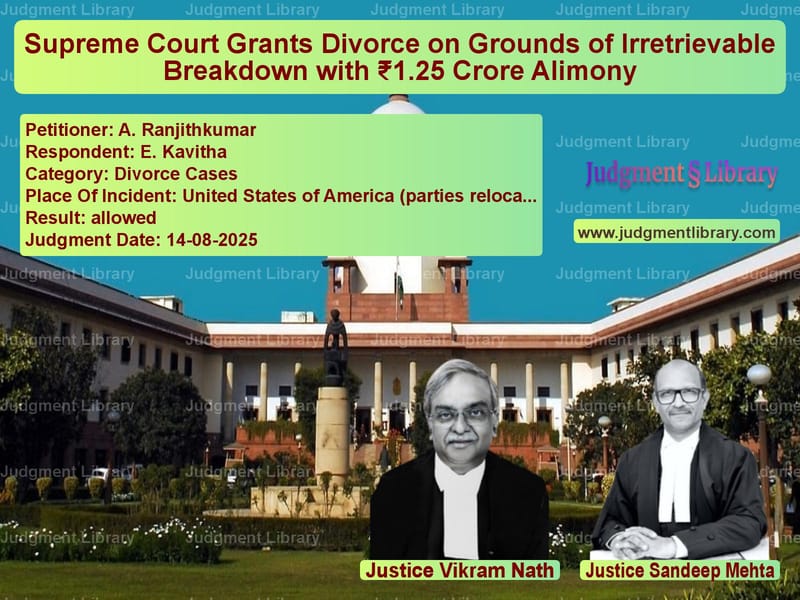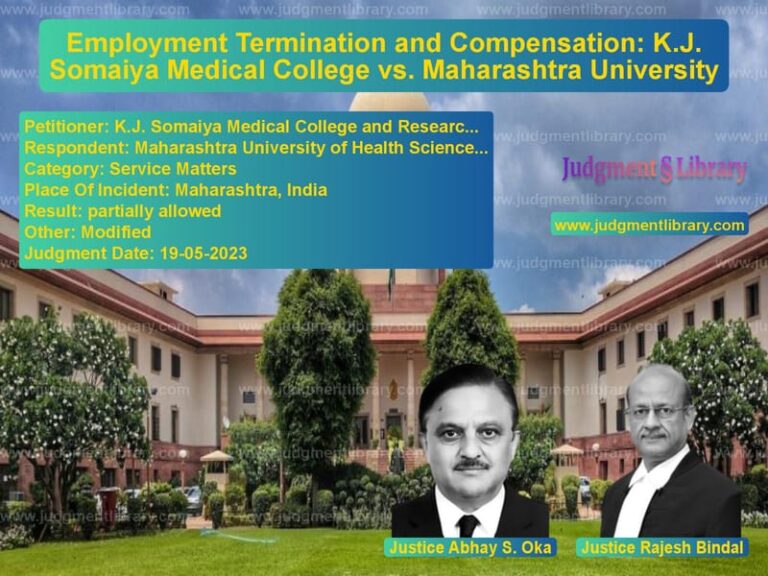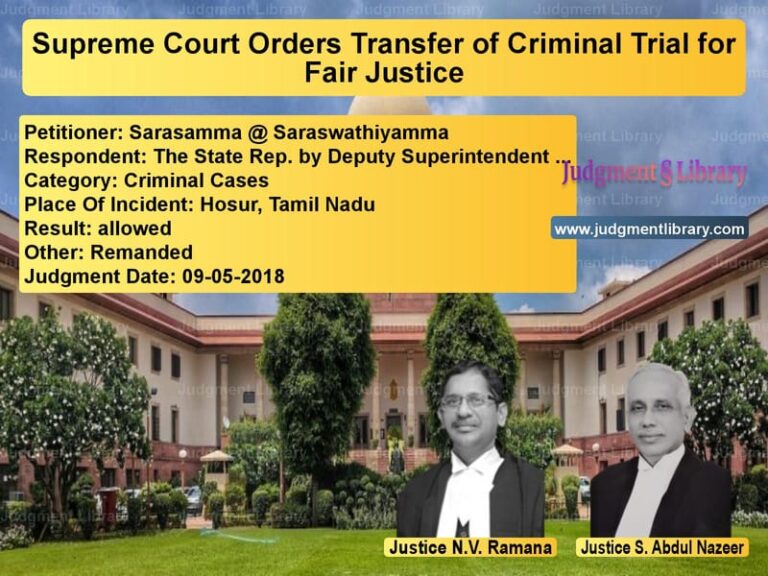Supreme Court Grants Divorce on Grounds of Irretrievable Breakdown with ₹1.25 Crore Alimony
In a landmark judgment that highlights the evolving approach of Indian courts to matrimonial disputes, the Supreme Court has dissolved a marriage that had effectively ended years ago, invoking its extraordinary constitutional powers to grant divorce on the ground of irretrievable breakdown. The case involved A. Ranjithkumar and E. Kavitha, a couple whose marital relationship had completely disintegrated after nearly 15 years of separation, with the husband having remarried in the interim period.
The Troubled Marriage and Initial Proceedings
The marriage between Ranjithkumar and Kavitha was solemnized on February 15, 2009, and the couple soon relocated to the United States where the husband was employed. The birth of their son on April 7, 2010, should have brought joy to the family, but instead, the relationship continued to deteriorate. By 2010, the parties had separated and begun living apart, marking the beginning of a long period of marital discord that would span nearly fifteen years.
On September 26, 2012, Ranjithkumar initiated legal proceedings by filing a divorce petition under Sections 13(1)(ia) and (ib) of the Hindu Marriage Act, 1955, seeking dissolution of marriage on the grounds of cruelty and adultery. After four years of legal proceedings, the Family Court delivered its verdict on October 17, 2016, granting a decree of divorce on the ground of cruelty while finding the allegation of adultery unproven.
The High Court’s Intervention
Kavitha, dissatisfied with the Family Court’s decision, filed Civil Miscellaneous Appeal No. 2678 of 2017 before the Madras High Court on January 11, 2017. Interestingly, although notice was issued to Ranjithkumar on February 14, 2017, it remained unserved. During this period, on March 5, 2017, Ranjithkumar contracted a second marriage, a development that would significantly impact the subsequent legal proceedings.
The High Court, in its judgment dated August 24, 2018, set aside the decree of divorce granted by the Family Court. The High Court made a crucial observation that would become central to the legal dispute: “the principal instance of cruelty accepted by the Family Court was the rude utterances of the respondent-wife’s father. The High Court held that while such utterances may have agitated the appellant-husband, the respondent-wife could not be held liable for them.” This finding by the High Court essentially meant that the grounds for divorce established by the Family Court were insufficient in law.
The Supreme Court’s Constitutional Approach
Faced with the High Court’s reversal of his divorce decree and already having entered into a second marriage, Ranjithkumar approached the Supreme Court challenging the High Court’s decision. The Supreme Court bench comprising Justices Vikram Nath and Sandeep Mehta took a pragmatic approach to the case, recognizing that the marriage had completely broken down beyond any possibility of repair.
The Court noted several crucial factors that made this case suitable for the exercise of its extraordinary powers under Article 142 of the Constitution of India. The judges observed: “It is evident that there is no possibility of reconciliation between the parties. They have been living separately since 2010, for nearly 15 years. There is no vestige of matrimonial relationship between them, and neither party has shown any inclination to resolve their differences.”
The Court further noted the significant development that “the appellant-husband has been remarried since 05.03.2017,” making the restoration of the original marriage practically impossible. In these circumstances, the Court concluded that “we see no purpose in continuing the legal relationship between the parties. The marriage has irretrievably broken down.”
Invoking Article 142 for Complete Justice
The Supreme Court’s use of Article 142 of the Constitution represents a significant aspect of this judgment. Article 142 empowers the Supreme Court to pass any decree or order necessary for doing complete justice in any cause or matter pending before it. The Court explicitly stated: “We are of the considered view that this is a fit case for granting divorce by invoking our powers under Article 142 of the Constitution. Accordingly, the marriage solemnized on 15.02.2009 stands dissolved.”
This approach demonstrates the Court’s willingness to look beyond technical legal grounds when faced with a situation where a marriage has completely broken down and there is no possibility of reconciliation. The Court recognized that insisting on maintaining a legal marriage that had ceased to exist in every practical sense would serve no purpose and would only prolong the suffering of both parties.
Substantial Financial Settlement
Recognizing that dissolution of marriage must be accompanied by adequate financial provisions for the wife and child, the Supreme Court directed a substantial financial settlement. The Court noted that “the appellant-husband has not provided financial support during these years” and therefore deemed it “just and proper to award a one-time lump sum as permanent alimony to the respondent-wife and their son.”
After considering “the financial status of both parties and the circumstances of the case,” the Court directed Ranjithkumar to pay “a sum of ₹1,25,00,000/- (Rupees One Crore Twenty-Five Lakhs only) as permanent alimony and all other claims of the wife would stand satisfied.”
Structured Payment Plan with Strict Consequences
The Supreme Court established a detailed payment schedule to ensure the wife received the financial support she was entitled to. The amount was to be paid in five equal quarterly instalments of ₹25,00,000 each, with the first installment due on or before September 15, 2025, and subsequent installments due every quarter until the final payment on or before September 15, 2026.
The Court included a crucial safeguard in its order: “It is further directed that in the event of any default in payment of any instalment, this order shall stand recalled, and any amount already paid by the appellant-husband shall stand forfeited.” This strict condition ensured that the husband would comply with the payment schedule, as failure to do so would result in the divorce being set aside while he would lose any amounts already paid.
Legal Significance and Precedent Value
This judgment represents an important development in Indian family law, particularly regarding the Supreme Court’s approach to marriages that have irretrievably broken down. While Indian law does not explicitly recognize “irretrievable breakdown of marriage” as a ground for divorce under the Hindu Marriage Act, the Supreme Court has increasingly used its constitutional powers under Article 142 to grant divorce in such cases.
The Court’s approach balances several important considerations: it acknowledges the reality of completely broken marriages, protects the financial interests of the economically weaker spouse (usually the wife), and ensures that technical legal grounds do not prevent justice in cases where marriages have clearly ended in every practical sense.
The judgment also demonstrates the Court’s pragmatic approach to situations where parties have already moved on with their lives, as evidenced by Ranjithkumar’s second marriage. Rather than forcing the parties to maintain a legal fiction of marriage, the Court chose to regularize the actual situation while ensuring adequate financial protection for the wife and child.
Broader Implications for Matrimonial Law
This case highlights the ongoing evolution of Indian matrimonial jurisprudence. While statutory law may not always keep pace with changing social realities, the Supreme Court has shown a willingness to use its constitutional powers to ensure that justice is done in individual cases. The judgment reinforces the principle that family law should serve the interests of justice and welfare of the parties rather than being constrained by technical legal requirements.
The substantial alimony award of ₹1.25 crore also signals the Court’s recognition of the financial implications of long-term marriages and the need to ensure that women are not left economically vulnerable after divorce, especially after long separations where they may have limited earning capacity.
Conclusion
The Supreme Court’s judgment in Ranjithkumar vs Kavitha represents a balanced and pragmatic approach to a complex matrimonial dispute. By invoking Article 142 to dissolve a marriage that had irretrievably broken down, while simultaneously ensuring substantial financial protection for the wife and child, the Court has demonstrated its commitment to doing complete justice in matters where technical legal provisions might lead to unjust outcomes.
The case serves as an important precedent for future matters involving long-separated couples and highlights the Supreme Court’s role in adapting legal principles to contemporary social realities. It reaffirms that the ultimate goal of matrimonial law is to serve the interests of justice and welfare of the parties involved, particularly in situations where marriages have completely broken down beyond any possibility of reconciliation.
Petitioner Name: A. Ranjithkumar.Respondent Name: E. Kavitha.Judgment By: Justice Vikram Nath, Justice Sandeep Mehta.Place Of Incident: United States of America (parties relocated there after marriage).Judgment Date: 14-08-2025.Result: allowed.
Don’t miss out on the full details! Download the complete judgment in PDF format below and gain valuable insights instantly!
Download Judgment: a.-ranjithkumar-vs-e.-kavitha-supreme-court-of-india-judgment-dated-14-08-2025.pdf
Directly Download Judgment: Directly download this Judgment
See all petitions in Alimony and Maintenance
See all petitions in Child Custody
See all petitions in Mutual Consent Divorce
See all petitions in Property Division in Divorce Cases
See all petitions in Domestic Violence
See all petitions in Judgment by Vikram Nath
See all petitions in Judgment by Sandeep Mehta
See all petitions in allowed
See all petitions in supreme court of India judgments August 2025
See all petitions in 2025 judgments
See all posts in Divorce Cases Category
See all allowed petitions in Divorce Cases Category
See all Dismissed petitions in Divorce Cases Category
See all partially allowed petitions in Divorce Cases Category







